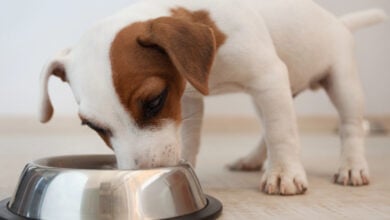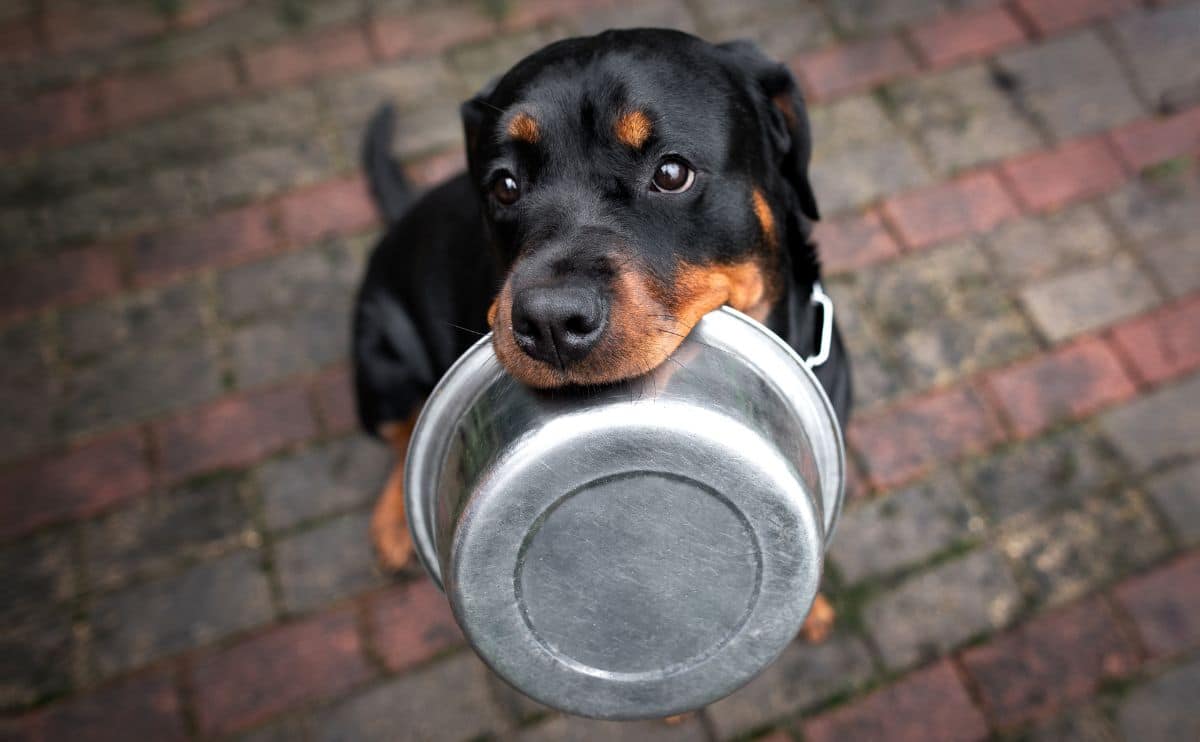Turkey, Gravy & Puppy-Dog Eyes: What Your Dog Can (And Can’t) Eat This Thanksgiving
When you purchase through links on our site, we may earn a commission. Here’s how it works.
Every Thanksgiving, the same drama unfolds. Your dog stares up from under the table, tail wagging, as you hold a fork full of turkey.
Table of Contents
You want to share. But you also remember last year’s upset stomach and that emergency vet bill.
So before you fork over a bite, here’s what veterinarians want you to know about dogs, turkey, and every other tempting dish on your plate.
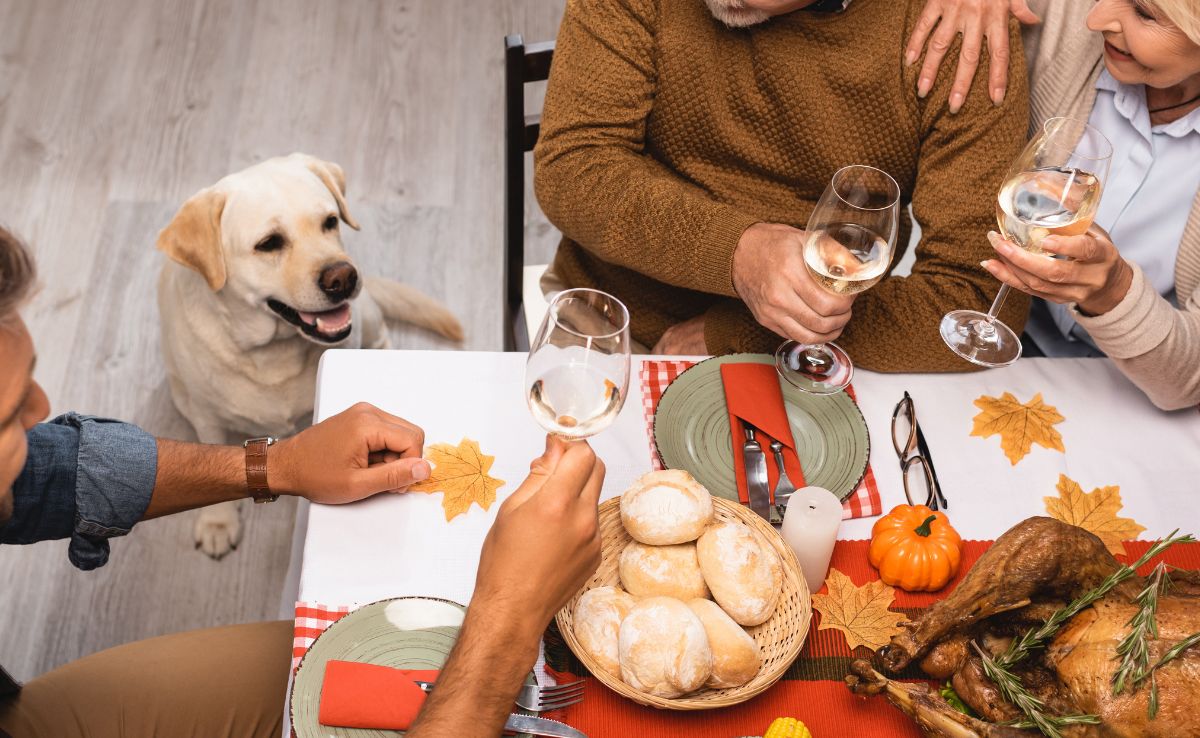
The Scene Every Dog Parent Knows
Those puppy-dog eyes are powerful. One look, and you start convincing yourself that a little turkey can’t hurt.
In some cases, you’re right. Turkey can be healthy for dogs when prepared safely, but it can also cause serious problems if it’s fatty, seasoned, or raw.
Before you give in, let’s look at what vets say about turkey safety and how to keep Thanksgiving fun for both you and your dog.
Our Thanksgiving Story: Lexie’s Special Plate
Our dog Lexie was a huge fan of The Farmer’s Dog turkey recipe, so naturally, at Thanksgiving time, we would share the extra turkey with her as a special treat.
I would make sure the meat we gave her was unseasoned without any skin or bones. Also chopped it up into bite-sized pieces and mixed it in unseasoned, cooked carrots and white rice for some grains and nutrients.
The turkey breast was higher in sodium than what she usually ate, but given it was only once a year and a special occasion, we made an exception.
– Sadie Cornelius, Cavalier King Charles Spaniel Dog Parent, Canine Journal Creative & Marketing

Vet Verdict: Is Turkey Safe For Dogs?
We asked Dr. Hannah Godfrey, MRCVS, what veterinarians really think about feeding dogs turkey. Her answer: It depends on how it’s cooked.
“Of all the meat options, turkey is one of the most suitable for dogs because it has a low-fat content,” says Dr. Godfrey. “Turkey is an excellent source of protein, which your dog needs to build and maintain muscle and other tissues. It also contains very little fat, making it a healthier alternative to fattier meats like pork and beef.”
Godfrey adds that turkey cooked in butter, oil, or seasoning can cause vomiting, diarrhea, or even pancreatitis. “A turkey dish with other ingredients like garlic or onions is dangerous as these are toxic to dogs. So plain, unseasoned turkey is safest.”
She also notes that raw turkey carries risks of Salmonella and Campylobacter infection, both of which can make pets and humans sick.
Quick Takeaway
- Safe: Plain, unseasoned turkey breast (no skin or bones)
- Risky: Fried, buttered, or seasoned turkey
- Dangerous: Bones, raw meat, garlic, onion, or heavy gravy
Pro Tip: If your dog’s meal smells delicious to you, it’s probably too rich for them.
The Turkey Trouble Guide: Bones, Skin, Raw & Deli Meats
Even when turkey seems harmless, it can cause hidden problems. Here’s what to avoid and why vets warn against it.
Turkey Bones = Vet Trip Risk
Cooked bones splinter easily, leading to choking or internal injury. Even a small shard can tear a dog’s stomach or intestines.
Learn more about the safety hazards of dogs eating bones, including what’s safe and what’s not.
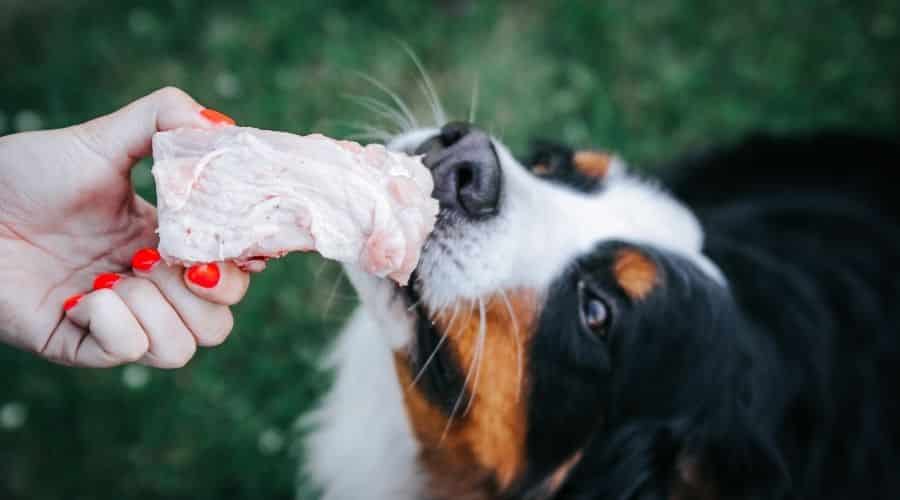
Our Real-Life Scare
My first rescue dog, Bear, a Labrador Retriever, once managed to sneak away with a turkey leg on Thanksgiving. He stole it from a younger kid’s plate, an easy target.
He crunched right through part of the bone before I was able to get it away from him. Thankfully, after a very scary and expensive trip to the emergency vet, he was ok.
– Danielle DeGroot, Rescue Dog Parent, Canine Journal Research & Writing
Turkey Skin = Fat Overload
High in grease and seasoning, turkey skin can trigger painful pancreatitis, especially in smaller dogs.
Raw Turkey = Bacteria Hazard
Dogs should not eat raw turkey due to the risk of ingesting harmful bacteria and parasites. The American Veterinary Association, the Centers for Disease Control (CDC), and the U.S. Food and Drug Administration all advise against it. Even a small amount can cause severe stomach upset.
Deli Turkey = Salt & Chemical Overload
Processed turkey isn’t just high in sodium. The International Agency for Research on Cancer (IARC), part of the World Health Organization (WHO), classifies processed meats, including deli meat, as Group 1 carcinogens — the same category as tobacco smoke and asbestos.
For dogs, the added nitrates and preservatives in deli turkey can lead to dehydration, digestive upset, and increased long-term cancer risk. Plain, freshly cooked turkey breast is always the safer choice.
Quick Takeaway: When in doubt, keep your dog’s plate plain. Think toddler-safe meal, not Thanksgiving buffet.
What Vets Want You To Watch For After Dinner
Even when you’re careful, dogs are quick. One dropped drumstick or sneaky counter surf can lead to trouble before you’ve even cleared the plates.
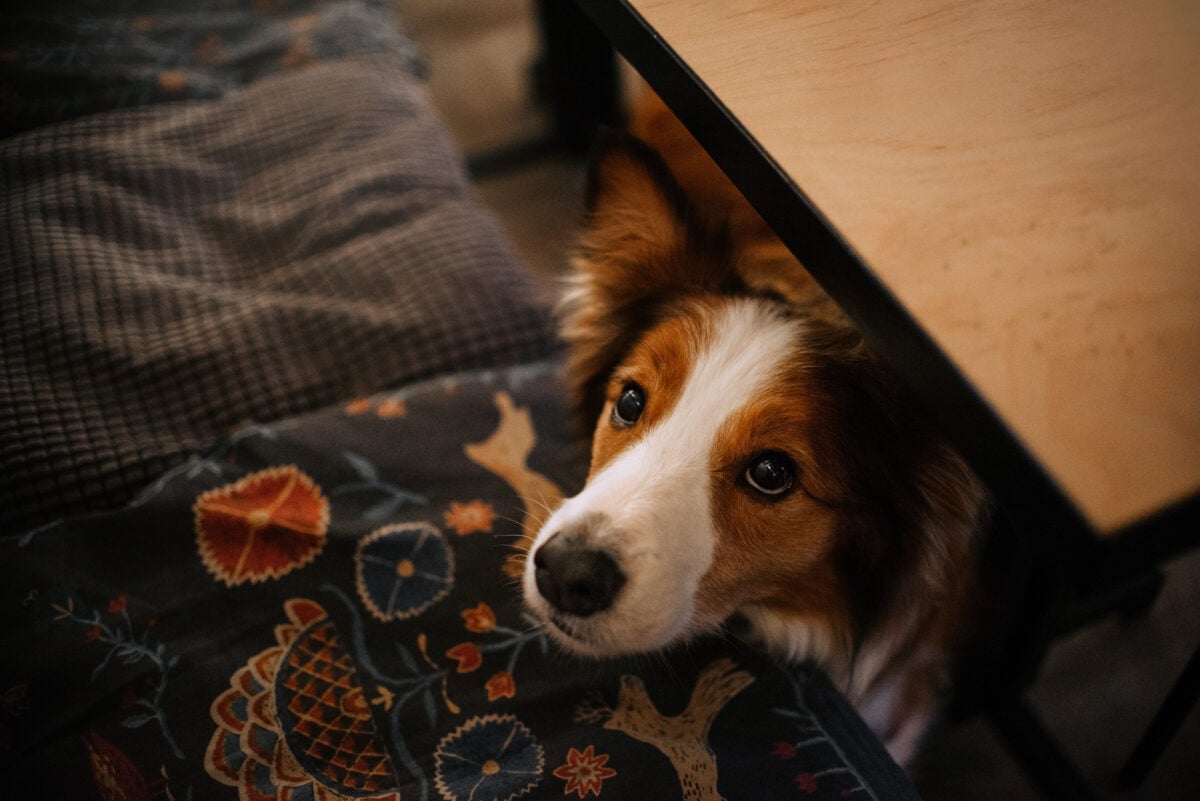
Veterinarians say the first few hours after a meal are when problems usually appear. Watch closely for signs of vomiting, diarrhea, whining, or stomach pain, such as pacing, panting, or curling up uncomfortably.
If your dog appears unusually tired, refuses to eat, or exhibits a distended abdomen, contact your veterinarian or an emergency clinic. These can be early signs of pancreatitis or an intestinal blockage.
Some dogs may also develop salt poisoning or dehydration after eating rich foods. Ensure your dog has access to fresh water and monitor their drinking and urination habits throughout the night.
60-Second Action Plan
If your dog ate bones, gravy, stuffing, or anything with onions or garlic:
- Remove any remaining food.
- Call your veterinarian or the Pet Poison Helpline (855-764-7661).
- Do not try to make your dog vomit unless instructed by a professional.
- Keep them calm and hydrated while waiting for advice.
Quick Takeaway: You’re not a bad dog parent if this happens. Even the best owners have had a Thanksgiving mishap. What matters most is acting fast and staying calm.
7 Thanksgiving Foods Ranked: Safe To Toxic
Not every holiday dish is a disaster waiting to happen. Some foods are perfectly safe for dogs in small amounts, while others can send you straight to the vet. Here’s how veterinarians rank the most common Thanksgiving sides from best to worst.
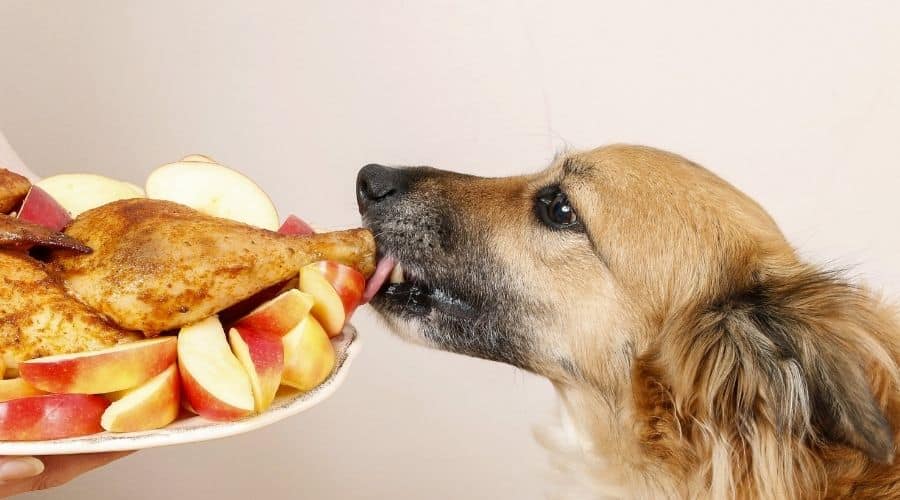
1. Plain Sweet Potatoes — Safe
Cooked, peeled sweet potatoes are a healthy, high-fiber treat for dogs. They’re packed with vitamins A and C, which support vision and immune health.
Just skip the butter, sugar, or marshmallows. Those extras can upset your dog’s stomach and spike their blood sugar.
2. Cranberries — Safe In Small Amounts
Fresh or dried cranberries are fine in moderation. They contain antioxidants and can benefit urinary health.
Avoid cranberry sauces or canned varieties made with sugar or artificial sweeteners. Xylitol, a common additive, is toxic to dogs even in tiny amounts.
3. Mashed Potatoes — Risky
Plain mashed potatoes are technically safe, but holiday recipes rarely stay plain. Butter, milk, salt, and garlic can cause digestive issues or, in large amounts, toxicity.
Solanine and oxalates in raw potatoes can also be harmful. Always serve them cooked, unseasoned, and cooled.
4. Pumpkin Pie — Not Safe
Pumpkin itself is excellent for digestion, but pumpkin pie is a sugar bomb. Most recipes include nutmeg and other spices that can hurt your dog’s stomach.
Stick with plain canned pumpkin if you want to share. Look for 100% pumpkin puree that is free from sugar and additives.
5. Dinner Rolls — Dangerous in Dough Form
Cooked rolls are mostly empty calories, but raw dough is where things get serious. When yeast ferments inside the stomach, it expands and produces alcohol.
This process can cause painful bloating and alcohol poisoning. The ASPCA Poison Control Center warns that unbaked yeasted dough can be life-threatening.
6. Gravy & Stuffing — Toxic
Most gravies and stuffing mixes include onion, garlic, and salt-heavy seasonings. These ingredients can damage a dog’s red blood cells and cause anemia.
Even homemade versions can hide risks if made with butter, drippings, or rich broths. The safest option is to skip both entirely.
7. Alcohol — Extremely Toxic
It only takes a small amount to cause poisoning in dogs. Alcohol depresses the nervous system, leading to vomiting, low blood sugar, and in severe cases, coma or death.
If your dog accidentally ingests a sip of wine or beer, contact your veterinarian or the Pet Poison Helpline immediately.
Quick Takeaway: When in doubt, feed your dog like a toddler — plain, simple, and unseasoned. A little turkey and sweet potato go a long way toward making them feel included.
If Your Dog Already Snuck A Bite
It happens fast. One second you’re passing the stuffing, and the next your dog has half a turkey leg dangling from their mouth.

Don’t panic. Most dogs recover fine after eating a small amount of rich food, but it’s essential to know when to take it seriously.
If your dog ate fatty meat, bones, or anything seasoned with onions or garlic, call your vet or the Pet Poison Helpline (855-764-7661). Describe exactly what they ate and how much. They can tell you whether to come in or monitor at home.
Watch for signs like vomiting, diarrhea, drooling, abdominal pain, or excessive panting. These could indicate irritation or early pancreatitis.
If your dog ate bones, don’t try to make them vomit. Sharp splinters can cause more damage when coming back up. Your vet may use imaging to check for blockages or recommend an injection to help the bone pass safely.
Keep your dog calm and hydrated while you wait for professional advice. Offer water, but skip food until their stomach settles.
Quick Takeaway: You’re not alone. Every holiday season, vets see a flood of “turkey emergencies.” Acting quickly and staying calm is the best gift you can give your dog.
Holiday Hacks: Include Your Dog Safely
You don’t have to shut your dog out of the celebration. A few thoughtful swaps can let them join the feast without the tummy trouble.
Instead of table scraps, try a plain turkey leftovers treat that’s safe for dogs.
Mix small pieces of cooked, unseasoned turkey breast with cooked carrots, green beans, and a spoonful of plain rice. Serve it as a mini holiday bowl while the rest of the family eats.
If you want to make something special, try this quick, vet-approved recipe.
Turkey Leftovers Treat Bites
Ingredients
- 3/4 cup cooked turkey chopped
- 1/2 cup dog-safe veggies
- 1/4 cup shredded cheese
- 1/4 cup sesame seeds
- 1 unbaked loaf of bread or pizza dough
Instructions
- Preheat the oven to 375°F.
- Roll out the dough and cut it into 3″ circles with a cookie cutter.
- Combine the water and flour in a saucepan, stirring until the flour dissolves. Heat on medium until the mixture thickens.
- Add the turkey and vegetables. Cook until the mixture is thoroughly heated.
- Simmer for a few minutes.
- Spoon one to two teaspoons of the turkey-veggie mixture onto each circle.
- Fold up the sides and pinch shut. Roll into a ball shape.
- In a separate small bowl, mix the cheese and sesame seeds.
- Roll or sprinkle each ball with the cheese-sesame seed mixture.
- Arrange the balls on a baking sheet and cook for 10-15 minutes, until golden brown.
Notes
Quick Takeaway: The best way to include your dog is with food made for them, not for you. It’s safer, healthier, and just as special.
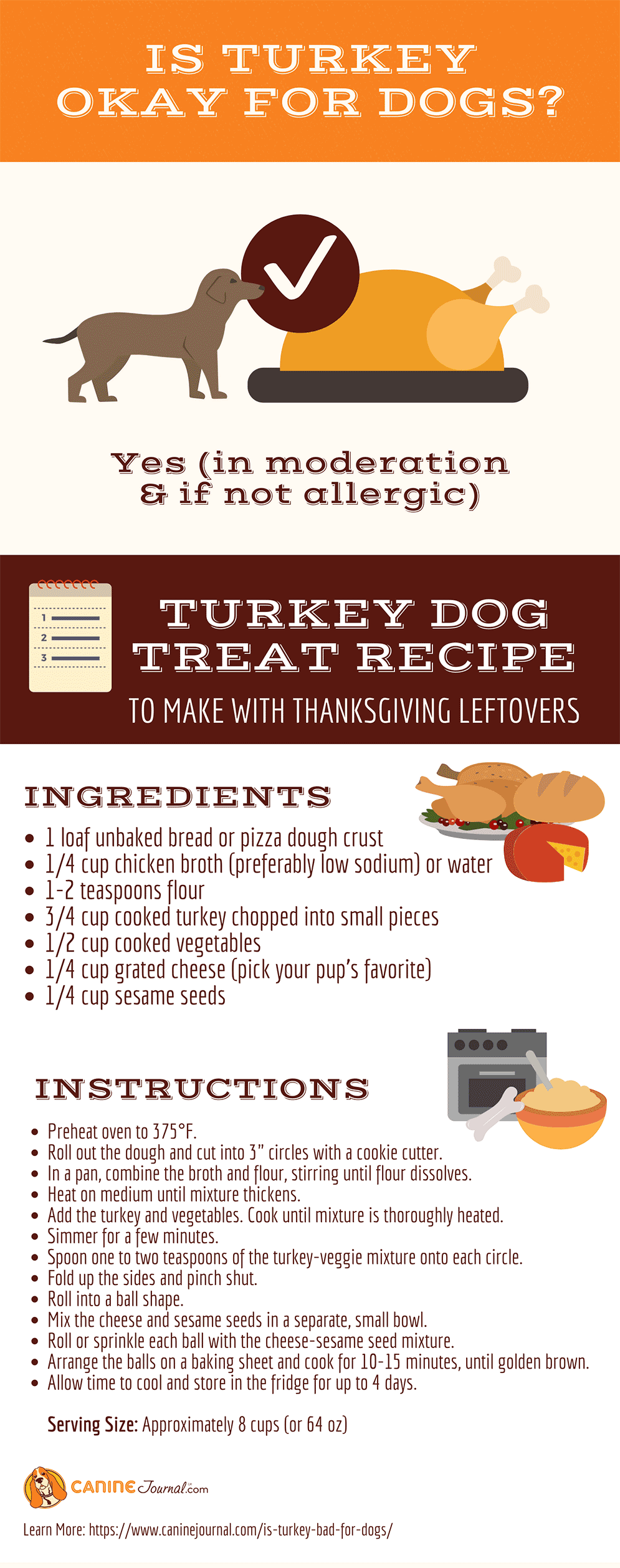
Does Your Dog Have A Food Allergy?
Some dogs have food allergies. If you see a pattern with your pup eating turkey and subsequently getting sick, you may consider removing the turkey from their diet.
To obtain more details on a possible food or environmental allergy, you can order this test and consult your vet for more advice.
While plain-cooked turkey is generally safe for your dog, many human foods are not. Pet insurance can be very helpful in the case of emergencies like eating something poisonous or a bowel obstruction.
Learn more about pet insurance, what it covers, and why it’s best to get coverage when your pup is young.
Frequently Asked Questions
Still wondering what’s safe to share from your holiday plate? Here are answers to the questions veterinarians hear most every Thanksgiving. Keep this list handy before your next big feast.
Don’t see your question? Respond in the comments, and we’ll get back to you!
Can Dogs Eat Cooked Turkey Bones?
No. Cooked bones splinter easily and can cause choking or internal injury.
Always throw away poultry bones before your dog can reach them.
Is Turkey Skin Bad For Dogs?
Yes. The skin is high in fat and absorbs oils and seasonings during cooking, which can trigger pancreatitis and digestive upset.
Can Dogs Eat Stuffing Or Gravy?
No. Most recipes contain onion, garlic, butter, or heavy salt — each of which can cause stomach irritation or toxicity.
Stick to plain turkey or dog-safe vegetables.
What Thanksgiving Foods Are Toxic To Dogs?
Onions, garlic, alcohol, chocolate, raisins, raw dough, and anything containing xylitol. Even small amounts of these can cause vomiting, lethargy, or more severe poisoning.
What Should I Do If My Dog Ate Turkey And Is Vomiting?
Call your veterinarian or the Pet Poison Helpline (855-764-7661). They’ll advise whether to monitor at home or bring your dog in.
Keep your dog hydrated and refrain from offering more food until the symptoms subside.
How Much Turkey Can I Safely Give My Dog?
A few small bites are plenty. Treat turkey like a snack, not a meal.
Consuming too much rich food can cause stomach upset or lead to long-term weight gain.
Is Turkey Good For Dogs With Allergies Or Sensitive Stomachs?
It depends on the dog. Turkey is a lean protein and is often used in limited-ingredient diets, but always introduce new foods slowly and watch for itching or digestive changes.
Fresh Dog Food: A No-Cook, Year-Round Alternative
If you are looking for a delicious pre-made turkey recipe to enjoy all year, I highly recommend you get your paws on The Farmer’s Dog. Your dog will gobble it up (or at least mine do!).
The Ollie brand makes another tasty and nutritious dog food with a fresh turkey recipe. Learn more about other fresh dog food options that can add flavor and nutrients to your pup’s bowl.

